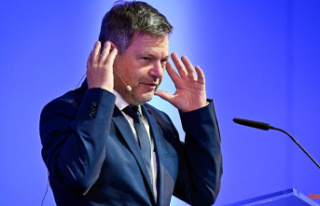Chancellor Scholz has spoken a word of power: The three nuclear power plants that are still connected to the grid will run until April 15, 2023. But the dispute should not be settled, as shown in the evening on "Hart aber fair" on ARD.
That was Chancellor Scholz's "power boom". It came late but was clear. The three nuclear power plants that are still on the grid will continue to run until April 15, 2023. This is a compromise in which the Greens and FDP lose a little, but also gain a little. Federal Economics Minister Robert Habeck from the Greens originally only wanted to leave two of the three power plants on the grid, but only in an emergency. Federal Finance Minister Christian Lindner from the FDP wanted to continue operating the power plants until the end of 2024. New fuel rods would have had to be purchased for this. Months ago, the power plant operators had refused to bear the additional costs resulting from an extension of the service life. The fuel rods would have had to be paid for with tax money, possibly even through an electricity price increase.
Now a law must be formulated quickly. The Bundestag is to decide on this later this week. Before that, there will be a heated debate. Katrin Göring-Eckardt from the Greens and Thorsten Frei from the CDU showed what that could look like on Monday evening on “Hart aber fair” on ARD.
Deputy President of the Bundestag Katrin Göring-Eckardt is at least happy that the discussion is now over. On April 15, the phase-out of nuclear power ended. "It's clear and it will stay that way," she says on "Hart but fair". However, she does not quite agree with the continued operation of the Emsland nuclear power plant. "It's not technically necessary," she says. Green leader Ricarda Lang had previously tweeted that. Nevertheless, the Greens parliamentary group will participate in a law that implements Chancellor Scholz's word of power. "We'll go over there," says Göring-Eckardt, who overall doesn't seem really happy with the situation she now has to put up with.
Economics Minister Robert Habeck also does not make the most satisfied impression in the subsequent daily topics. He seems a little subdued when he praises the Chancellor, who has now ended the dispute between him and Lindner for the time being. It was too long, there obviously couldn't have been a solution, he says. But then there is also a little relief when he says: "Despite all the difficulties, we have achieved great things in the last few months. Now we can turn our attention to other things."
It was an "unusual solution to a deadlock", but he could live and work with the Chancellor's decision. "The decision shows the way forward."
The fact that Chancellor Scholz draws his sharpest sword is "something totally extraordinary," says the parliamentary director of the Union faction, Thorsten Frei, on "Hart but fair". He calls the decision a "lazy compromise". It means twelve percent higher costs and 14 tons of additional CO2 emissions. In addition, Germany would trample on European solidarity, "because we switch off power plant capacity and wait on the other side for others to provide us with electricity and gas." It won't work that way, and the probability that we will experience a blackout this winter and next has now increased.
While moderator Plasberg describes the nuclear power plant discussion as a "dispute about Pipifax", economist Jens Südekum finds it superfluous. The really decisive problems are the gas supply, the construction of the liquid gas terminals or the regasification capacity in the North Sea. Nevertheless, he is satisfied with Chancellor Scholz's decision: If the nuclear power plants had been kept connected to the grid until 2024 or longer, that might have harmed the expansion of renewable energies, according to Südekum.
At the end of the show, moderator Plasberg asks the group what they would say to Habeck and Lindner if they were in an elevator together for a few seconds. And this is where Göring-Eckardt finds the clearest words: "You know: nuclear power is over."












